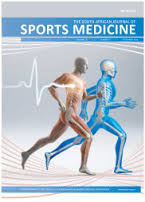Experiences and rehabilitation needs of runners with anterior knee pain in under-resourced communities in Ekurhuleni, Gauteng, South Africa
DOI:
https://doi.org/10.17159/2078-516X/2020/v32i1a6969Abstract
Background: Anterior knee pain (AKP) is a common knee injury resulting from overuse, and impact negatively on the quality of life of many runners. Runners with AKP in under- resourced poor communities present with poor health outcomes.
Aim: To determine the experiences and rehabilitation needs of runners in under-resourced communities in Ekurhuleni, South Africa.
Methods: The study was qualitative, based on the focus group interview method. Interviews were conducted with 12 runners. They were aged from 18 to 45 years and had a history of AKP. Permission was obtained from club managers and consent from each participant. An interview schedule with predetermined questions was used to collect the data. Two researchers conducted the interview, a facilitator and moderator. The interview session lasted for 80 minutes. Audio recordings of the interview session were made, transcribed verbatim and notes taken, with the final result provided in a written report. The data approach was thematic and deductive in nature.
Results: All 12 recruited participants participated. The participants were comprised of six females and six males, eight youths and four adults; seven had ≤5 years of running experience and five had 10 years. The following themes and subthemes emerged: 1) The negative impact of AKP on health (physical, emotional and social); 2) Limited rehabilitation services (availability, accessibility, affordability, adequacy and appropriateness); 3) Rehabilitation needs (knowledge and professional intervention).
Conclusion: The study showed the negative impact of AKP on health and the problem of the paucity of rehabilitation services. A community based rehabilitation programme is therefore recommended for runners.
Downloads
Downloads
Published
Issue
Section
License
The South African Journal of Sports Medicine reserves copyright of the material published. The work is licensed under a Creative Commons Attribution 4.0 (CC BY 4.0) International License. Material submitted for publication in the South African Journal of Sports Medicine is accepted provided it has not been published elsewhere. The South African Journal of Sports Medicine does not hold itself responsible for statements made by the authors.
How to Cite
- Abstract 784
- PDF 637





.png)